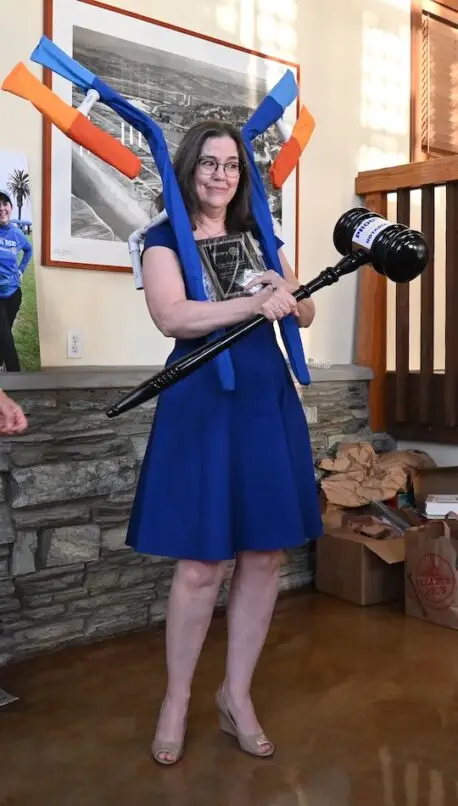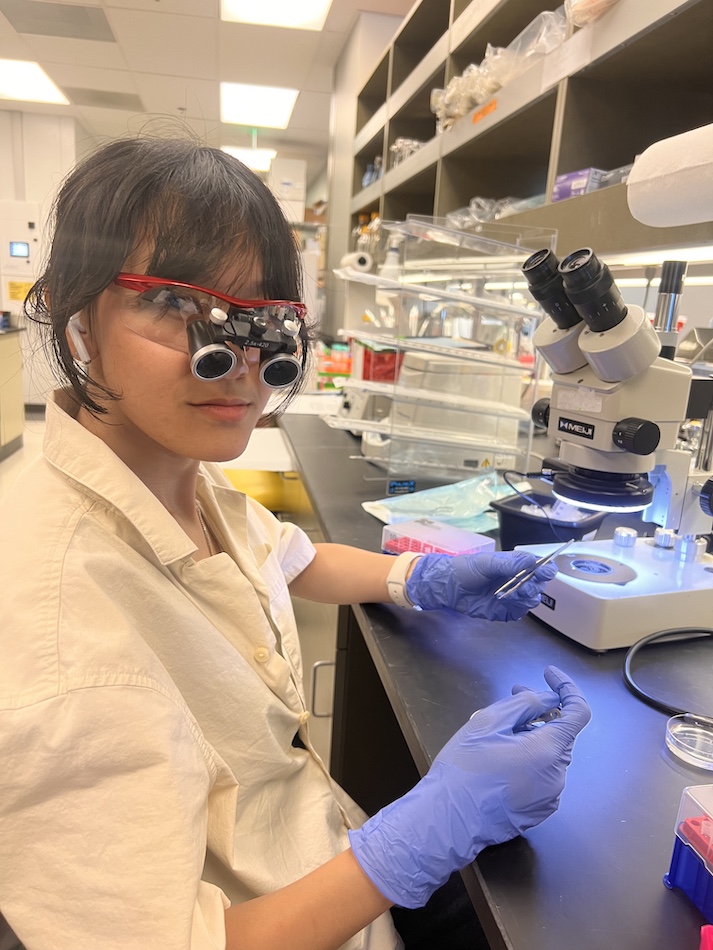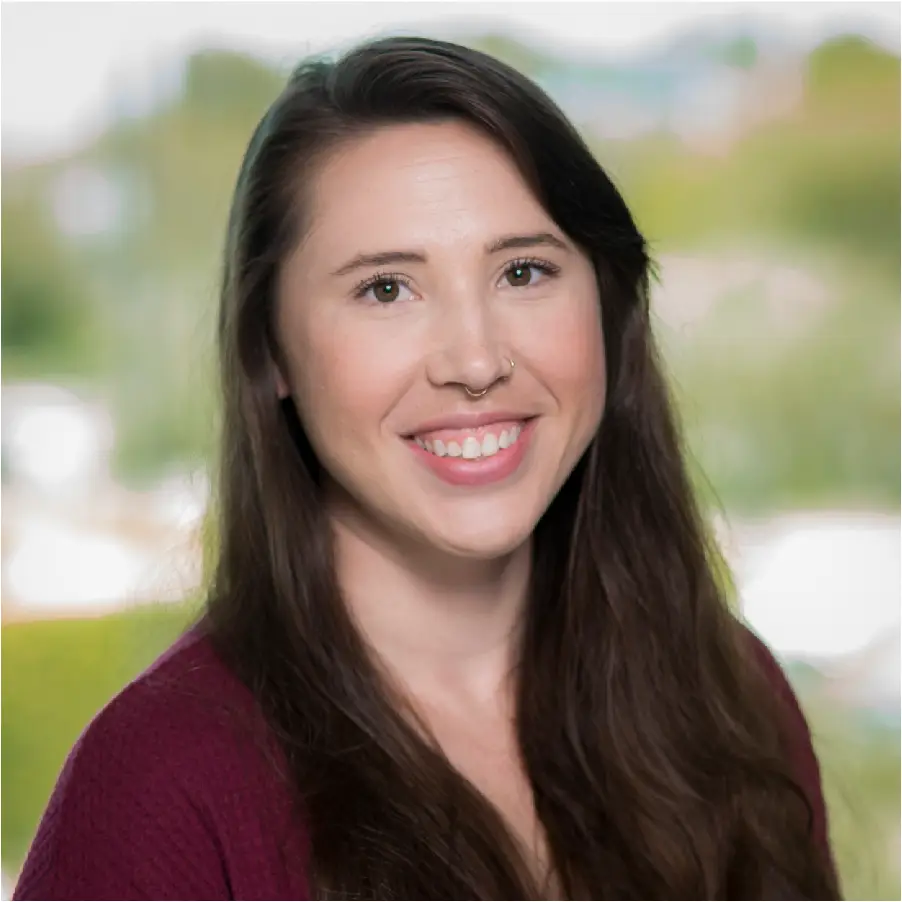In mathematics, a “random walk” is used to describe a path that comprises a series of random steps within a mathematical space. Sharon Schendel, Ph.D., who works as a senior project coordinator in the Saphire Laboratory at La Jolla Institute for Immunology (LJI), has often thought of her career as a bit of a “random walk” that took her in several different directions, none of which were actively planned.
Initially, Schendel wanted to go medical school, but ended up in basic research instead. She holds a Ph.D. in biophysics from Purdue University. After completing her postdoctoral training, she focused her career on strengthening collaboration and communication in the sciences.
After a dozen years in scientific publishing, Schendel returned to a lab setting in 2017, when she joined the Saphire Lab at Scripps Research to serve as science writer and project manager for the Viral Hemorrhagic Fever Immunotherapeutics Consortium (VIC). Managing the VIC was a massive undertaking, and Schendel worked with laboratories around the world to coordinate studies of antibodies against some of the deadliest viruses known to humanity. Thanks to Schendel and the VIC, scientists have made major advances in addressing Ebola virus, Lassa virus, and other pathogens.
Then in 2020, after the Saphire Lab had moved to LJI, Schendel stepped up to coordinate the Coronavirus Immunotherapy Consortium (CoVIC), an international effort to study antibodies against SARS-CoV-2. Her efforts helped advance our understanding of how scientists might design more effective COVID-19 vaccines and therapies. [Recent CoVIC findings]
Outside of the lab, Schendel is always looking for ways to serve others and provide mentorship that makes an impact. She volunteered with Voices for Children as a Court Appointed Special Advocate, or CASA, to support local children placed in foster care. As a CASA, Schendel spent time getting to know the young person both on an informal level by taking them on outings (trips to the driving range were a favorite) and a formal level by ensuring that scholastic progress or medical care was on track.
“Many CASAs dislike writing court reports,” Schendel says. “But for me it was my favorite part of being a CASA. I felt that I could tell the story of the child I advocated for and help the judge and social workers see that child from a different perspective.”
Then, seven years ago, Schendel attended a meeting that changed how she thought about community service. Schendel had arranged for a young scientist she knew to speak at a meeting of the Rotary Club of Del Mar about her research on the microbiome. The talk went great, and Schendel was taken with the range of projects the club supported and how welcoming the members were. The members invited her back and asked her to consider joining.
Schendel says the Rotary Club of Del Mar is known for supporting ambitious international projects. Since she joined, the club used Global Grants from Rotary International to launch a project to send vocational training teams to Ethiopia for several weeks at a time.
“These teams would train local clinicians in neonatal resuscitation techniques and train them in such a way that they could train other people,” says Schendel. “They’ve gone on to incorporate this into the curriculum of medical training in the region—and there was a substantial reduction in neonatal mortality in that area that was served.”

Instead of swooping in to complete a single project, Schendel and her club members worked to improve the infrastructure surrounding medical care in the area. “We followed up with a second Global Grant, which was probably a little bit more utilitarian, but was more difficult. This grant provided an autoclave [for sterilizing medical tools] and heavy duty washing equipment,” Schendel says. As the club made these purchases, they also worked to update the plumbing and electrical work so the equipment could run properly.
Just like in her VIC and CoVIC work, success came down to coordinating with international partners. “These grants require you to partner with the Rotary Club in the area to be served,” says Schendel. “Your club may think the people on the ground need one thing, but members of the other Rotary Club are actually living there. They understand the cultural dynamics.”
Schendel says she surprised herself when accepted the club’s nomination to be club president. “I’m usually more content to be in the background in a supportive role,” Schendel says. And yet she did step up. “I wanted to make weekly meetings fun and engaging,” she says. “And I felt like I had the skills to do that.”
The Rotary Club of Del Mar marked the end of Schendel’s term as president with a send off ceremony, which included the gift of a giant gavel and an antibody costume. (Photo courtesy Sharon Schendel)
During her term as president, she helped bring new speakers to club meetings and organize winery tours, free community events, local community service, and of course, international service projects. Schendel’s one-year term ended in July, but she’s ready to assist with the club’s next big project. Their hope is to establish a “train the trainer” program in Tanzania to support surgeons working in pediatric orthopedics.
Just before her term began, Schendel attended an annual Rotary Club Convention, held in Houston, TX. “I tried to get out there and meet a lot of new people,” Schendel says. “And that’s not my personality at all, but through Rotary you just immediately have a connection—even talking about the club, you know, what’s your signature project? What is your passion?”
“I was just on a call yesterday and was asked to help with a Boys and Girls Club program. Every year they honor a ‘Youth of the Year,’ and this year they needed a female judge. I said, of course I could do it,” says Schendel. “One of the students that we were interviewing actually asked us a question first, you know, what’s your motivation?
“And it’s important to me to let younger people know that older people really do want to help. And to tell older people to make yourself available as a mentor—even just to help students figure out ‘How do I get into this field? What are the things I need to do?’ It really doesn’t take that much time, but it makes a lot of difference.”


